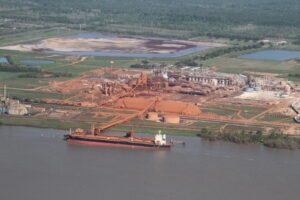
Aluminum is a key component in solar panels and wind turbines, more efficient cars and planes, and long-lasting construction materials. As demand for low-carbon products grows, aluminum demand is projected to rise about 40 percent by 2030. But production of this lightweight and durable metal is energy-intensive and pollution heavy, including climate emissions from fossil fuels, sulfur dioxide from smelters and refining operations, destructive mining practices, and mercury contamination of rivers.
A new report by the Environmental Integrity Project details the impacts of the “mining-to-metal” production chain and identifies opportunities for the U.S. industry to reduce climate emissions and clean up its act as aluminum becomes part of a more sustainable economy.


